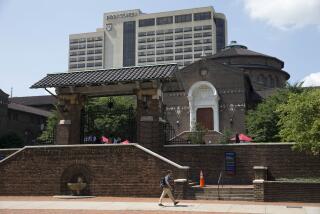Washington and Lee University will remove Confederate flag replicas
- Share via
Washington and Lee University in Lexington, Va., has agreed to remove replicas of Confederate flags several months after 12 black law students demanded their removal from campus.
The flags in the university’s Lee Chapel were replicas of original Confederate flags that were returned to the Museum of the Confederacy in 1993 because they were deteriorating.
The replica flags were displayed behind a statue of Robert E. Lee on the stage of Lee Chapel. Original Confederate flags, on loan from the American Civil War Museum, will now be displayed on the bottom floor of the chapel, which houses the Lee Chapel Museum.
“I’m excited about the progress we were able to create on campus,” said Brandon Hicks, a member of the 12-student group called the Committee. The group views the Confederate flag as a symbol of oppression. Hicks said some classmates were initially shocked by the demand, which included a threat of civil disobedience if their requests were not met by Sept. 1. But “the administration and law school has been really helpful about facilitating conversation about inclusivity on campus,” Hicks said.
Among other demands, the students asked the school to apologize for its role in slavery and to condemn Civil War general and school namesake Robert E. Lee’s role in slavery.
But President Kenneth P. Ruscio said in a statement that “Lee was an imperfect individual living in imperfect times.” The president said he still personally took “pride in his significant accomplishments here and will not apologize for the crucial role he played in shaping this institution.” The school also acknowledged its involvement with slavery until 1852 and is working on learning more about the role of African Americans at the university.
An editorial in the Spectator, a conservative student publication, criticized the Committee’s demands and said it was “ludicrous to assume that the university’s display of Confederate flags in Lee Chapel indicates institutional support for slavery or racism.”
But some students found the way the school handled the complaints encouraging: “It’s difficult for the university to balance its controversial past with an eye on the future,” said Hernandez Stroud, a third-year law student at the school who wasn’t part of the 12-member group.
“People don’t change for institutions, institutions change for people,” Stroud said.
Twitter: @yoli_martinez
More to Read
Sign up for Essential California
The most important California stories and recommendations in your inbox every morning.
You may occasionally receive promotional content from the Los Angeles Times.













